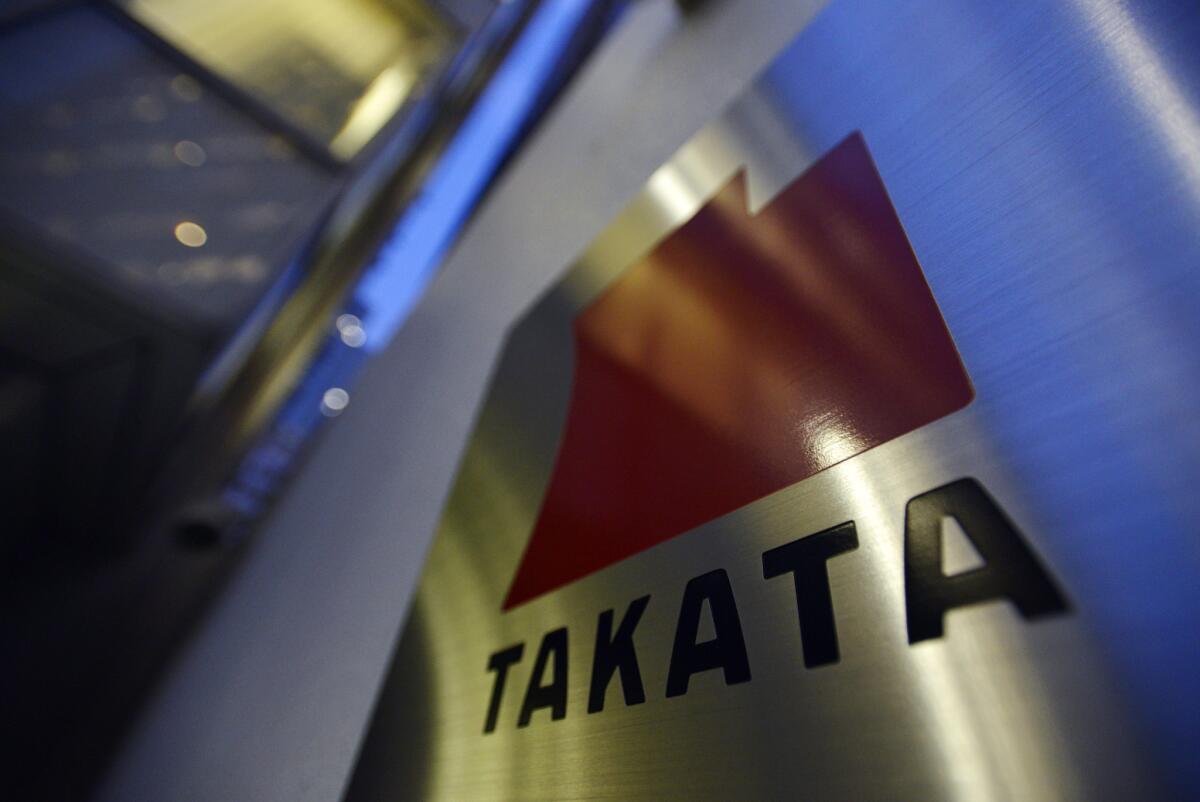NHTSA fines Takata for not cooperating in probe of exploding air bags

- Share via
Federal safety regulators levied fines of $14,000 a day on Japanese air bag manufacturer Takata Corp. for not cooperating with the Department of Transportation’s investigation into defective air bag inflators that have killed at least six people and injured more than 60 others in the U.S. and overseas.
The National Highway Traffic Safety Administration has ordered Takata to provide pertinent information about the flaws in its air bag system. Some inflators, which use an explosive charge to quickly inflate the air bag to provide a cushion for vehicle occupants in a crash, are blowing apart, sending shrapnel into the cabin.
Most recently, Honda said an air bag inflator in a 2002 Accord exploded on Jan. 18 in Houston, killing a 35-year-old man.
Regulators said Takata flooded the agency with 2.4 million pages of documents but failed to provide any type of index or guide, which is required by law and vital for a speedy investigation.
“Safety is a shared responsibility and Takata’s failure to fully cooperate with our investigation is unacceptable and will not be tolerated,” Anthony Foxx, U.S. Transportation secretary, said in announcing the fines. “For each day that Takata fails to fully cooperate with our demands, we will hit them with another fine.”
In a letter to the air bag manufacturer, NHTSA chief counsel O. Kevin Vincent said, “Takata is neither being forthcoming with the information it is legally obligated to supply, nor is it being cooperative in aiding NHTSA’s ongoing investigation of a potentially serious safety defect.”
He said the agency plans to take depositions of Takata employees based in the U.S. and Japan.
Takata issued a statement saying it was “surprised and disappointed” by the federal action.
“We have also been meeting regularly with NHTSA engineers on efforts to identify the root cause of the inflator issue,” Takata said. “That work has, so far, supported our initial view that age and sustained exposure to heat and humidity is a common factor in the small number of inflators that have malfunctioned.”
Safety advocates welcomed the NHTSA move.
“It certainly is sending a strong signal that NHTSA is getting tough,” said Clarence Ditlow, executive director of the Center for Auto Safety. “This is a welcome change for agency that once referred to the companies that it regulates as its partners.”
It also coincides with NHTSA efforts to reach current and former Takata employees who might have evidence that the automotive parts supplier covered up what it knew about the faulty inflators.
“NTHSA is doing all they can to help the Department of Justice build a criminal case,” he said.
But he said the fine was too small to make much of an impact.
“It will take more than two months to even reach $1 million,” Ditlow said.
NHTSA has levied the maximum allowed by law, fining Takata $7,000 each for two violations. The first was the company’s failure to “fully respond” to an Oct. 30 order to provide information. The second $7,000 daily fine is for failure to comply with a similar order issued Nov. 18.
The agency is lobbying Congress to increase the amount of the fines it can impose.
Takata has rejected demands that it recall its air bags, which are in millions of cars dating back more than a decade. Automakers are recalling the cars, but some repair efforts have been stymied by a lack of replacement parts.
Honda is the most affected and has urged owners of its cars to bring them to dealers to have the inflator replaced.
Approximately 6 million Honda vehicles in the U.S. have Takata air bags, and about 2.8 million have officially been recalled.
Though Honda is Takata’s biggest customer, air bag flaws haven’t been limited to that maker. Roughly 11 million vehicles in the U.S. have been affected, including models from Toyota, Mazda, Nissan, Mitsubishi, Subaru, Chrysler, Ford and BMW.
The problem has sparked several safety investigations and litigation.
A lawsuit against Takata and Honda filed last year in federal court in Los Angeles by Hagens Berman Sobol Shapiro, seeks class-action status and claims Takata cut corners to build cheaper air bags and that Honda purchased the parts to slice its manufacturing expenses.
The Berman complaint claims that Takata knew of the deadly defect at least 13 years ago, first seeing the problem in an Isuzu vehicle but failing to take action.
NHTSA stepped up its enforcement action last year after being criticized in congressional hearings for not moving quickly enough to force the recall of older General Motors Co. vehicles with faulty ignition switches that have been linked to crashes that have caused at least 52 deaths.
Last month the agency fined Honda $70 million for two violations related to a failure to report deaths and injuries in a timely matter. The fines were tied to 1,729 cases, some of which regulators believe involved faulty Takata air bags.
Transportation officials are pushing for the passage of the Grow America Act. The legislation would raise the maximum amount of NHTSA fines to $300 million from the current $35 million. It would also increase NHTSA’s investigations budget threefold, to $31.3 million, and give it the power to halt sales of defective vehicles.
The legislation, Foxx said, “would provide the tools and resources needed to change the culture of safety for bad actors like Takata.”
Foxx and NHTSA chief Mark Rosekind announced the penalties during a informational tour to push for increased safety regulation and funding.
They also urged Congress to pass legislation prohibiting rental car agencies and used car dealers from renting or selling vehicles subject to a recall without first making necessary repairs.
The rental car companies and traffic safety advocates support the legislation, but it has run into opposition from some car dealers and dealer groups.
Follow me on Twitter (@LATimesJerry), Facebook and Google+.







